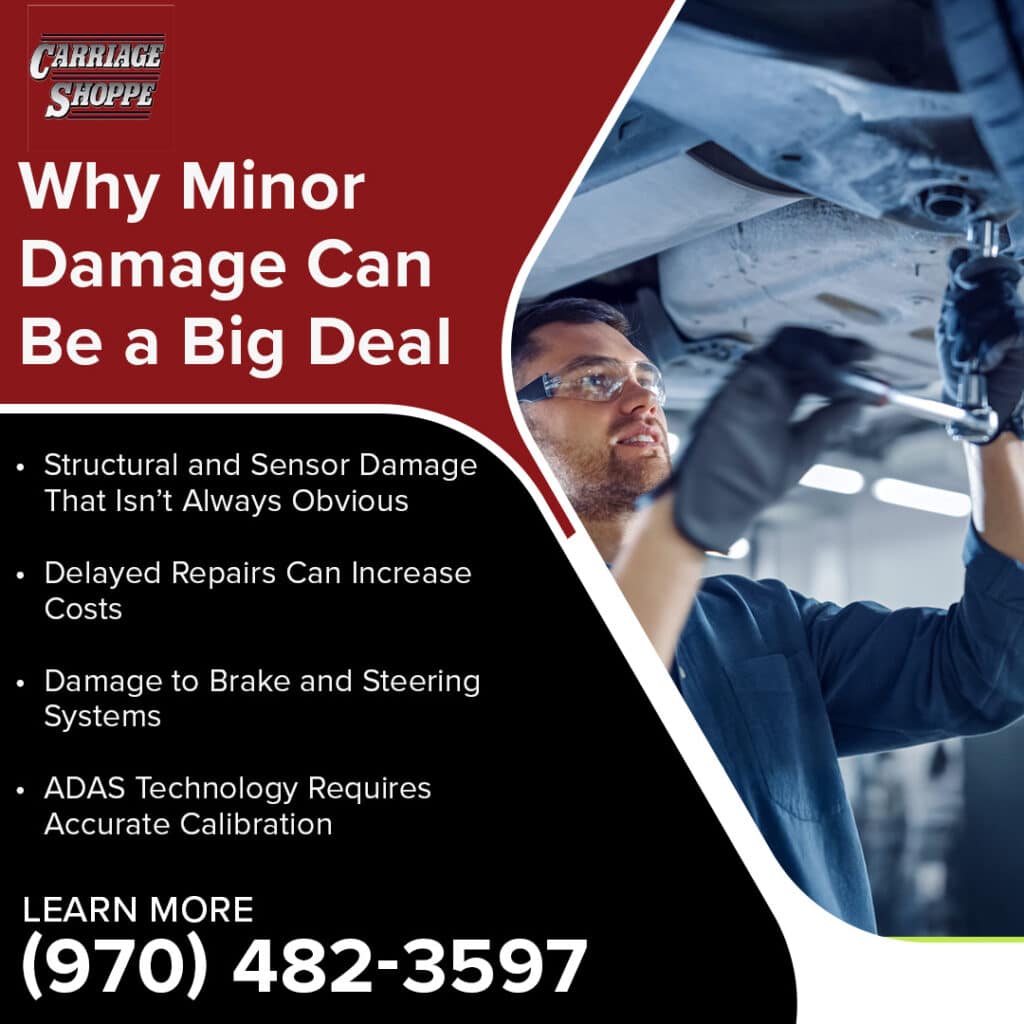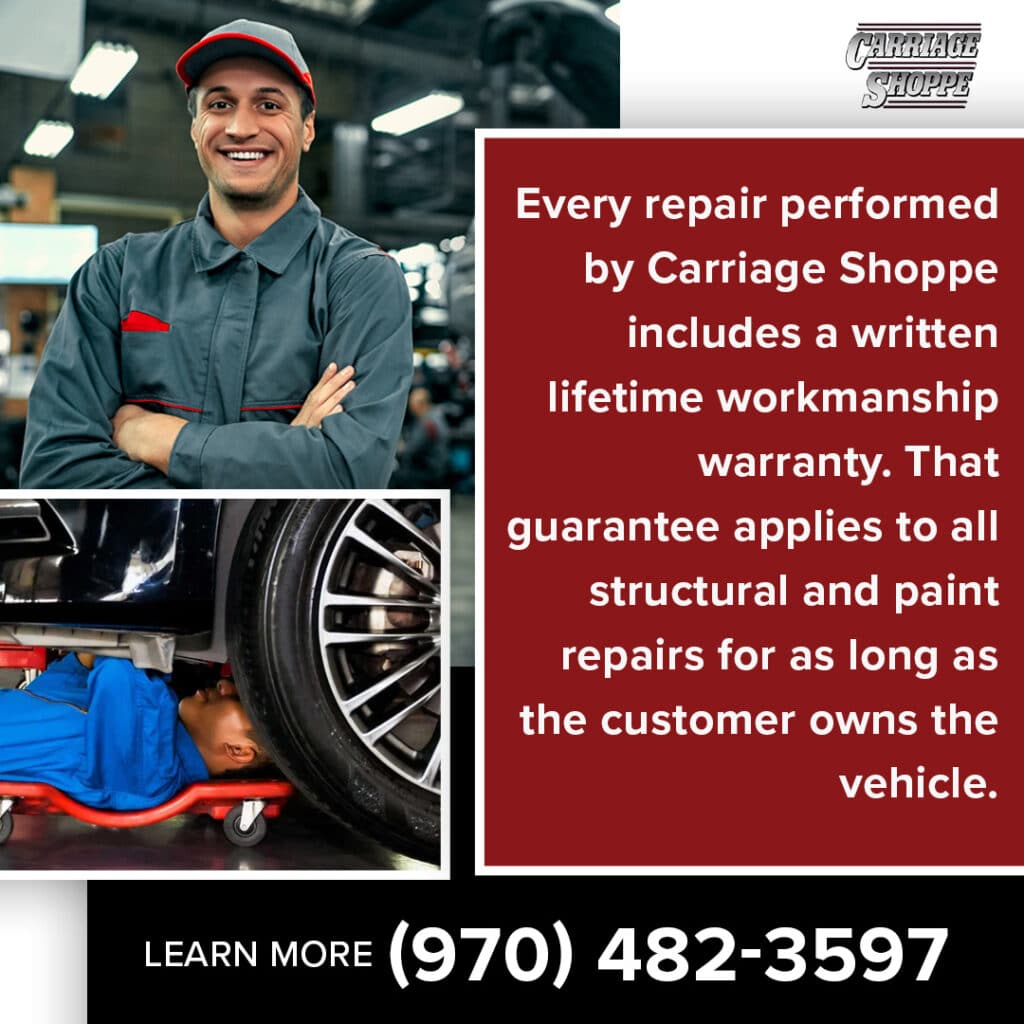Even low-speed accidents can cause damage that puts your safety at risk. You might not see anything more than a scuff, dent, or misaligned panel, but underneath, your vehicle could be hiding frame stress, sensor faults, or compromised alignment. Ignoring these signs may lead to higher repair costs, safety issues, or insurance complications in the future. That’s why it’s important to schedule a professional inspection at an auto collision shop equipped to detect and correct the full scope of damage.
At Carriage Shoppe, we help drivers throughout Northern Colorado identify and correct hidden collision damage before it creates larger problems. If you’re unsure whether a small impact deserves attention, this article will show you what to watch for and when it’s time to act. As a trusted provider of auto collision repair in Fort Collins, CO, we’ve repaired thousands of vehicles using manufacturer-approved methods, certified technicians, and calibrated systems—because no repair should ever compromise your safety or your vehicle’s long-term performance.

The Misconception About “Minor” Vehicle Damage
Many drivers assume small dents or scratches are only cosmetic. But even light damage can signal a larger problem hidden beneath the surface.
Surface-Level Damage Doesn’t Always Stay on the Surface
Even small exterior damage can indicate deeper mechanical or structural issues. A dent in the fender or a shifted bumper might look harmless, but these signs often mean the impact force traveled beyond what you can see. The structure beneath the surface, mounting brackets, crash bars, suspension points, or steering arms, may already be affected. What looks like a simple bumper crack could be hiding a bent reinforcement bar or sensor misalignment.
Vehicle design relies on precise connections between structural and safety components. Sensors that control airbags, lane assist, or braking functions are often mounted just behind body panels. If those panels move, even slightly, they can disrupt how these systems perform.
We also see cases where alignment changes go unnoticed until uneven tire wear appears or handling feels off. These problems often come from minor frame distortion. Left uncorrected, this stress can affect how your car drives, turns, or reacts in emergencies.
How Delays Can Affect Repair Scope and Cost
Waiting to repair minor collision damage often leads to expanded repairs and higher expenses. The longer you wait to repair visible damage, the more you risk larger, more expensive issues. Moisture seeps through even the smallest cracks in paint, leading to corrosion that spreads through body seams and undercoating. Once rust reaches these areas, it weakens the metal and makes panels harder to repair or salvage.
Alignment problems caused by small impacts also tend to get worse with time. A tire that’s off by just a few millimeters may begin to drag, stressing the suspension and affecting brake performance. Uneven wear builds slowly but eventually leads to full tire replacement, brake service, or component failure.
A minor bumper adjustment today could turn into a full panel or subframe replacement next month. These types of cost increases are common, especially when weather and road debris worsen small problems over time.
If you’ve had a minor accident, a quick visit to an auto collision shop can prevent bigger problems. At Carriage Shoppe, our auto collision repair in Fort Collins, CO, includes full diagnostics to catch hidden damage early, saving you time, cost, and avoidable wear in the future.
Safety Systems at Risk After Even Low-Speed Collisions
Even if your car still drives fine after a minor accident, your safety systems may not be working the way they should. These failures don’t always show up on your dashboard, and that’s where the real danger begins.
Airbag Sensors and Deployment Reliability
Impact damage can affect airbag sensor performance without an obvious warning. Your airbag system depends on a network of sensors built into your vehicle’s frame, bumper, engine compartment, and cabin. These sensors are designed to detect specific force patterns and trigger airbag deployment at the right moment during a collision. The problem is that even a light bump can shift a sensor just enough to change how it responds in a future crash.
If your car took a hit to the front, side, or rear, especially near the bumper, it’s possible that the impact misaligned one or more sensors. The dashboard may not show a warning right away. Some airbag faults only become apparent during diagnostic scans or, worse, during a crash when the airbags fail to deploy or trigger too late. This isn’t just a mechanical issue. It’s a safety risk for you and every passenger in the vehicle.
According to data from the National Highway Traffic Safety Administration (NHTSA), frontal airbags reduce driver fatalities by 29% in front-end crashes. But that only works if the system responds correctly. A misaligned or damaged sensor can compromise this protection without your knowledge. After any collision, even at low speeds, a complete diagnostic scan is necessary to confirm that your airbag system will still perform as designed.
At Carriage Shoppe, our certified technicians perform full sensor verification as part of every auto collision repair in Fort Collins, CO. We use manufacturer-specific scan tools to inspect the integrity of every sensor involved in airbag timing and deployment.
ADAS Function Disruptions That May Go Unnoticed
Collision shifts can cause Advanced Driver Assistance Systems (ADAS) to malfunction or disable. ADAS Systems are built to help you avoid accidents before they happen. This includes lane-keeping support, adaptive cruise control, blind-spot alerts, and automatic emergency braking. These features depend on precise input from radar units, forward-facing cameras, and proximity sensors. What most drivers don’t realize is that these sensors can be affected by even minor bumps or parking lot scrapes.
If a camera mounted behind your windshield is knocked out of alignment or if the radar sensor behind your bumper shifts by just a few millimeters, the system may no longer detect obstacles, vehicles, or lane lines accurately. These errors often go undetected by the driver. The only way to detect them is through proper calibration at a professional collision center.
Most modern vehicles require manufacturer-specific calibration tools to realign these systems. Without this step, the car may react unpredictably during critical moments. Lane-keeping assistance might steer incorrectly. Forward-collision warnings may activate too late. These problems are not obvious during normal driving but can affect your ability to respond safely in real-world conditions.
At Carriage Shoppe, every ADAS-equipped vehicle receives sensor calibration using OEM-approved systems. Whether you need car collision repair after a front-end bump or a rear fender scrape, our technicians restore these technologies to exact factory standards at our Fort Collins collision center.
Common Collision Issues That Aren’t Always Obvious
Frame Stress and Alignment Shifts
Even light structural deformation can affect drivability and impact resistance. The frame supports your car’s handling, balance, and crash absorption. Even a low-speed impact can shift this structure enough to affect steering, suspension geometry, or energy distribution in future accidents, often without any visible damage. A few millimeters off-center can change how your vehicle responds under pressure.
You might not feel the difference right away. Misaligned panels, uneven tire wear, or doors that no longer shut cleanly can be early indicators. If left alone, these shifts can interfere with electronic systems. Camera angles, radar accuracy, and sensor readings all depend on correct structural positioning to function properly and safely.
Suspension and Steering Performance Changes
Collision impact can cause hidden wear in suspension or steering components. Suspension and steering components are built to absorb impact, but collisions often stress parts like struts, control arms, tie rods, and bushings. You might feel changes in how the car handles, hear knocking over bumps, or notice it pulls to one side while driving.
These symptoms may seem minor at first, but they tend to get worse. Damage can spread from one side of the vehicle to the other over time. What starts as a rattle can lead to alignment loss or steering failure. If anything feels different after an accident, schedule a full inspection before problems escalate.
Brake System Sensitivity After Impact
Brake parts near collision zones can shift out of position or wear prematurely. These components, including rotors, calipers, and ABS sensors, sit close to areas that absorb crash forces. Even a minor impact near a wheel or bumper can affect how those parts perform.
Damage isn’t always visible. Brake lines may bend slightly, causing inconsistent pedal feel or delayed stopping. If your pedal pulses and braking take longer or ABS fails to engage, those are signs that the system isn’t functioning as intended. These issues can develop gradually, but they often point back to unaddressed impact-related changes underneath the vehicle.
At Carriage Shoppe, every full car collision repair in Fort Collins, CO, includes safety system checks to confirm that critical components, like brakes and ABS, perform within factory specifications. We correct both visible and hidden damage at our certified Fort Collins collision center.
Why Prompt Auto Collision Repair Prevents Long-Term Problems
Even minor collision damage can create problems that extend far beyond the initial impact. You might think the issue is limited to cosmetic blemishes, but many of the most expensive repairs we see start small and grow worse because they weren’t addressed early.
Corrosion and Environmental Damage from Untreated Surfaces
Unprotected metal and compromised coatings increase the risk of long-term corrosion. If your vehicle’s paint or protective coating is scratched or chipped, the metal underneath is no longer shielded from air or moisture. That exposure leads directly to rust. In Colorado, winter road salt and freezing moisture speed up this process.
Corrosion spreads to fasteners, joints, seams, and even structural components hidden beneath the surface. You might not see it forming, but by the time bubbling or flaking appears, the damage is deeper than it looks. Corrosion in key areas like rocker panels or frame rails weakens your vehicle’s structure and may impact crash safety or drivability.
Preventing this starts with a proper refinishing process. A certified auto collision shop will not only repaint damaged areas but also reseal and recoat panels using materials designed to match the vehicle’s original protection. That’s the difference between a short-term fix and a long-term safeguard.
Tire and Component Wear from Hidden Misalignment
Driving with minor misalignment reduces tire life and adds mechanical stress. Even if your wheels look straight after a collision, the suspension may have shifted slightly. Just a few degrees off can change how your tires touch the road. That shift causes tires to wear unevenly.
Misalignment doesn’t just cost you in tires. It increases rolling resistance, which lowers fuel efficiency. More strain is placed on suspension parts like tie rods, bearings, and bushings. If these components wear out under pressure, repairs go from a basic alignment to a full suspension overhaul, an expensive problem that started with a barely noticeable issue.
Prompt service at a shop for collision repair in Fort Collins, CO, helps identify and correct these alignment changes before they affect your steering, fuel economy, or safety. Skipping this step often leads to more than just new tires—it creates a chain of stress across connected systems.
Chain Reactions: How One Issue Creates Others
Unrepaired damage in one area can affect other vehicle systems over time. Damage from a minor collision rarely stays in one place. A cracked headlight mount might shift the sensor alignment for your adaptive headlights. A bent wheel hub could place uneven pressure on the rotor, leading to early brake failure. Even a misaligned bumper might cause vibration that wears down bushings in the steering system.
These examples aren’t rare. We’ve seen small repairs multiply into five-figure bills after a few months of driving. One missed issue turns into several, and by then, you’re looking at major mechanical work, not just surface correction. Every part of your vehicle is connected. Damage left untreated spreads, and the longer you wait, the more costly and time-consuming it becomes.
At Carriage Shoppe, we don’t isolate one problem. We look at how each part of the vehicle interacts. During every car collision repair, we examine related systems to stop that chain reaction before it starts. That approach saves our customers time, money, and future maintenance.

Why Carriage Shoppe Is the Trusted Fort Collins Collision Center
Certified Auto Collision Repair Backed by Manufacturer Standards
Carriage Shoppe technicians follow OEM guidelines for repairs, parts, and calibration. Your vehicle is engineered with specific materials and structural guidelines, so repairs must follow the same standards. At Carriage Shoppe, our technicians are certified by major automakers like Honda, Ford, Hyundai, and Nissan. These certifications require direct brand training and process validation.
We use brand-specific tools, repair data, and approved materials for every auto collision repair. Safety sensors, welds, and frame details differ by model. That’s why we follow manufacturer procedures precisely on every vehicle we repair.
Lifetime Workmanship Warranty and Direct Insurance Coordination
A lifetime warranty backs our work for structural and paint repairs. Every auto collision repair we perform at Carriage Shoppe includes a written, transferable lifetime workmanship warranty. If we replace or refinish a part, we stand behind that work for as long as you own your vehicle. That commitment starts with the repair and stays with you.
We also manage the insurance process from start to finish. You’ll receive clear updates, estimates, and documentation throughout. Our team works directly with your insurance provider to prevent delays and confusion, so you’re never left guessing about the next step.
Serving Northern Colorado with Precision, Integrity, and Accountability
Carriage Shoppe repairs every vehicle with a focus on accuracy and verified structural integrity. Our team uses digital measuring systems, 3D frame mapping, and OEM-calibrated tools to inspect and correct even the smallest misalignments that can affect safety and handling.
Modern vehicles depend on complex systems like adaptive cruise, lane assist, and crash mitigation. These features require precise calibration after a collision. If anything is out of place, the car may not respond properly when it matters most.
Don’t Overlook Minor Damage—Contact Carriage Shoppe Today
If your vehicle has been in an accident, no matter how minor, don’t wait for small issues to become bigger problems. At Carriage Shoppe, we provide certified auto collision repair in Fort Collins, CO, using manufacturer-approved methods, advanced diagnostic tools, and detailed inspections that cover what other shops miss. Call (970) 482-3597 or email us at officestaff@carriageshoppe.com to book an appointment or ask questions about our repair process.
